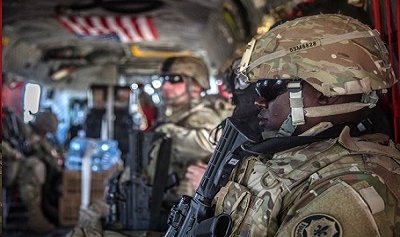President Gives Mattis Authority to Set U.S. Troop Strength in Afghanistan: Jim Garamone
The secretary spoke about this delegation in his opening statement during a budget hearing of the Senate Appropriations Committee’s defense subcommittee this morning.
“The American military effort in Afghanistan must be viewed as part of a larger regional context in South Asia,” Mattis told the senators. “Our primary national interest and the international interest in Afghanistan is ensuring it does not become an ungoverned space from which attacks can be launched against the United States, other nations or the Afghan people,” he said.
Partnered Operations, Training Afghan Forces
To meet this national interest, U.S. forces are conducting partnered counterterrorism operations in Afghanistan, while other U.S. forces are working with NATO’s Resolute Support mission to train Afghan security forces to shoulder their country’s security mission.
“At noon yesterday, President Trump delegated to me the authority to manage troop numbers in Afghanistan,” Mattis said. “The delegation of this authority – consistent with the authority President Trump granted me two months ago for Iraq and Syria – does not, at this time, change the troop numbers for Afghanistan.”
Interagency Partners
Mattis promised to work with interagency partners to define the way ahead. “I will set the U.S. military commitment, consistent with the commander in chief’s strategic direction and the foreign policy as dictated by Secretary of State [Rex] Tillerson,” he said.
The fight in Afghanistan remains important, the secretary said, noting that Afghanistan was the staging ground for the al-Qaida terrorists who attacked America on Sept. 11, 2001.
“I would say that the reason we have not been attacked over many years from where the 9/11 attack originated is heavily due to the sacrifices that we have made over years as we have kept the enemy on the back foot,” Mattis said. “It’s hard for them to conduct external operations out of that former stronghold when they are just trying to hang onto their own lives and avoid us.”
Part of the reason for a resurgence of violence in Afghanistan was that international support was reduced too soon, he said. “We pulled out our forces, at a time … when the violence was lower,” he said. “But we pulled them out on a timeline, rather than consistent with the maturation of the government and the security forces.”
U.S. and coalition forces are working the support mission, and Afghan forces will receive the air support that was in short supply, the secretary said.
About 13,000 U.S and coalition troops are currently in Afghanistan.
(Follow Jim Garamone on Twitter: @GaramoneDoDNews)



